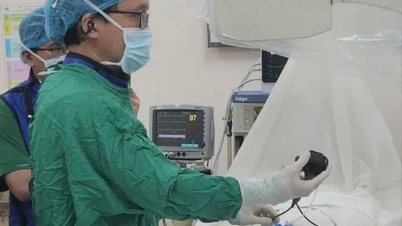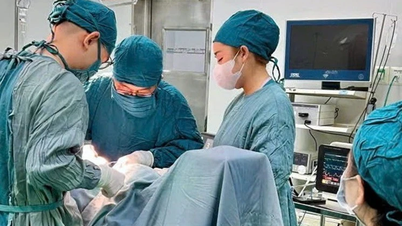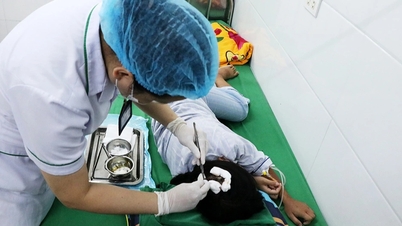
Excessive dieting can lead to many consequences, including hormonal decline - Illustration photo
One of the most worrying consequences is secondary amenorrhea, which can lead to endocrine disorders, decreased bone density and long-term effects on reproductive health. The case of a patient diagnosed at MEDLATEC Nghe An General Clinic below is one of the warning bells for parents.
Suddenly lost period for 10 months
About a year ago, NTPC (16 years old, Nghe An) started losing weight by dieting and exercising (lost 7kg in 2 months).
After losing weight, the female student returned to her normal routine but has not had a period for 10 months. Her parents took her for a general health check-up but no abnormalities were found. Her parents were worried so they continued to take her to the clinic for endocrine testing.
Here, the doctor conducted a clinical examination and prescribed the necessary techniques for diagnosis. Based on the patient's medical history, she started having periods at the age of 12. After a period of amenorrhea, she used herbal medicine for 2 months (unknown type) to regulate her period but had no results.
On the ultrasound image of the adnexa, no abnormalities were detected. Test results showed that the LH index was 1.19 mU/ml and E2 was 16.93 pg/ml, slightly decreased. The patient was diagnosed with functional secondary amenorrhea due to hypothalamus.
The doctor prescribed a medical treatment regimen, scheduled a follow-up visit after 4 months, and instructed me to follow a healthy lifestyle including eating a nutritious diet, not staying up late, getting enough sleep, and avoiding stress.
Consequences of strict dieting and high-intensity gym training during puberty
With the fear of being discriminated against for their appearance when they weigh more than the majority, or wanting to follow the trends of "Chinese sisters" on social networks, many young people in puberty fall into the spiral of unscientific weight loss methods, especially fasting, extreme calorie cutting and high-intensity exercise. This not only affects physical development but also causes serious endocrine problems.
MSc. Nguyen Thi Trang - obstetrics and gynecology specialist - said: "Secondary amenorrhea of hypothalamic function is a disorder of the hypothalamic-pituitary-ovarian axis, often occurring when the body is affected by prolonged stress, rapid weight loss, excessive exercise or eating disorders.
At that time, the brain reduces the production of GnRH hormone, causing the pituitary gland to not secrete enough FSH and LH to stimulate ovarian activity, leading to temporary amenorrhea.
Doctor Trang further warned that if not detected and treated early, prolonged secondary amenorrhea can cause many serious consequences such as:
• Decreased bone density, early osteoporosis due to prolonged estrogen deficiency;
• Systemic endocrine disorders, causing psychological changes, insomnia, fatigue and decreased concentration;
• Reduced fertility or secondary infertility due to long-term cessation of ovulation;
• Affects cardiovascular health and energy metabolism, increasing the risk of lipid disorders or immunodeficiency.
The doctor also advised: "Functional amenorrhea can be reversed if detected early and lifestyle adjustments are made appropriately. Young people, especially adolescent girls, should not lose weight too quickly or go on extreme diets, as this not only affects hormones but also negatively impacts overall health and future fertility.
It is necessary to maintain a balanced diet, get enough sleep, exercise moderately, and keep a relaxed spirit. If you have missed your period for 3 months or more, go to a medical facility specializing in obstetrics and endocrinology for timely examination and treatment to avoid the condition becoming chronic."
Source: https://tuoitre.vn/nu-sinh-16-tuoi-an-kieng-tap-gym-cuong-do-cao-gay-vo-kinh-thu-phat-nguy-co-anh-huong-buong-trung-2025102008344994.htm


![[Photo] National Assembly Chairman Tran Thanh Man holds talks with Hungarian National Assembly Chairman Kover Laszlo](https://vphoto.vietnam.vn/thumb/1200x675/vietnam/resource/IMAGE/2025/10/20/1760952711347_ndo_br_bnd-1603-jpg.webp)
![[Photo] Solemn opening of the 10th Session, 15th National Assembly](https://vphoto.vietnam.vn/thumb/1200x675/vietnam/resource/IMAGE/2025/10/20/1760937111622_ndo_br_1-202-jpg.webp)
![[Photo] Chairman of the Hungarian Parliament visits President Ho Chi Minh's Mausoleum](https://vphoto.vietnam.vn/thumb/1200x675/vietnam/resource/IMAGE/2025/10/20/1760941009023_ndo_br_hungary-jpg.webp)
![[Photo] The Steering Committee of the 2025 Fall Fair checks the progress of the organization](https://vphoto.vietnam.vn/thumb/1200x675/vietnam/resource/IMAGE/2025/10/20/1760918203241_nam-5371-jpg.webp)










































































































Comment (0)